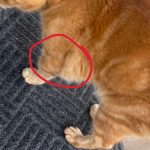Hello,
For these cases I talk a lot with owners about trying to identify the underlying cause. Often it is poor diet and sedentary life but there are also diseases and illnesses that can contribute. If able start to learn how to palpate your cats colon and feed watery wet food and use the fiber supplements and laxatives. Exercise is also very important. For these cats we start training in a harness to go outside for walks. I feel that if you don’t increase environmental enrichment and stimulation they won’t start moving.
But before all of this you have to remove the obstructive feces. This often needs a vets help. Call rescues and shelters and keep asking for affordable help.
My cat is currently on the hospital for confinement, he has UTI and is not fond of water these days. How can I engage him into drinking water and not forcefully feed him water?
PS: I already have water fountain on the way but I’m not sure if he’ll get comfy on drinking there and if there are any other ways to make him drink water
Comments
My 9 yr. old Megacolon cat Eli wasn’t able to poop. It happens sometimes. He’s on Cisapride and Merilax daily, but he still get’s backed up. When he started vomiting after not being able to BM and jumping out of the litter box I took him to the vet. They did an enema on June 20th. He’s still backed up! I can’t afford 1k plus to have a vet manually extract the feces (this is Washington, DC area – everything is very expensive!). He hasn’t started throwing up again, but he’s not eating much and I need to find out if there is something I can do more at home to get him through this emergent time. I can’t just watch my cat suffer. I have Pedi lax, but don’t know if that would help or hinder at this point. I watch videos on palpitating the colon to try and break up the feces. I know there are specific enemas to give cats at home. Is it too late to try this? My vet is frankly bad and too busy to bother, so she said to just go to the emergency. It sure seems like there are other steps that can be taken ,,,at least I hope so becuase I just don’t have that kind of money left with the cost for caring for my hospice Husky, Loki. Help!
Comments
Household “accidents”, need advice, please!! I have 3 cats, 3 dogs, and a toddler human. In the past few months my two youngest “house trained” dogs (9 & 5 yrs) and my youngest cat (4 yrs) have been purposely relieving themselves in different parts of my house. The dogs poop/pee on the floor, in the past month they began peeing on my couch, it’s gotten so bad I have to keep them in crates most of the time they’re inside. The cat will pee on my toddlers belongings – first on clothes in his laundry basket (which is now inside a closet) and on his stuffed animals (which I had to hide in a bin), now has resorted to peeing on any accessible hard plastic toys. If I put the cat in a kennel she uses the litter box 100% of the time, once releasing her she’ll behave for 1-2 days then starts up again. The dogs will have “accidents” within 10 minutes inside after being outside for 30-60+ minutes. I have 3 litterboxes, each with a different kind of litter, all clean, no diagnosed medical issues (taken all 3 to the vet twice since this started $$$). My oldest dog has been going through dementia for the past year, it’s getting worse but not yet at the point of euthanasia. I started preparing to move the past 6 months, house is almost done being packed/cleared. I’m not sure which/both/none are triggers for them acting this way. All of them have moved with me before and they never did this on previous moves. Vet prescribed multiple anxiety meds which are not helping at all, they have no other solutions to offer. Ironically my 14yr old dog with dementia barely ever has accidents in the house. Personality wise they aren’t acting any different. Messes are thoroughly cleaned immediately and they don’t even bother to do this secretively, all 3 seem to purposely do it right in front of me. The situation is driving me to my wits end, I really need help 🙁 Besides keeping them all in crates I have no other solution. Does anyone have insight to what I can do? Thanks so much!
Comments
Looking for information regarding polyps. In January of this year (2022) my then 3 1/2 year old cat developed what seemed like nasal congestion. She would snore, wheeze and “slurp” through her mouth. After 2 rounds of antibiotics they discovered she had a polyp under her soft pallet. After removal of the polyp her symptoms subsided a little but never completely. We then tried steroids but these did not help either. Now they are recommending I go to a specialist/internal medicine veterinary hospital to get a rhinoscopy and ct scan to see if there are additional polyps or some other kind of blockage. The initial consult visit would be $250 and the scoping and ct scan would cost $2500 to $3200. Is it common for cats to have more than one polyp and is there other treatments you would try before the very costly next step my vet is suggesting? I’ve already spent $1000 with what we have done so far so I am looking for any suggestions you can offer! I hate seeing her uncomfortable!! I should mention that she is not sneezing or coughing, but shake her head sometimes. She is eating fine and acting mostly fine except when lying down as that is when the difficulty breathing seems to get the worst.
Comments
Our 13 yo Cairn Terrier went to his usual grooming appt today. The groomer called me and said after his bath, he was crying constantly and seemed panicked. He was pacing and crying.
She thinks it may have been a seizure or something like it. When I picked him up from her, he was very happy to see me. We went home, he ate and is now acting like his normal self. The ER vet had a 10 hour wait! And no other vet can see him.
Comments
My 4 yr old cat seems constipated. I just lost my job a couple of weeks ago and cannot afford to take him to the vet. I noticed on Wednesday he only pooped once and it was kind of hard. He didn’t poop Thursday. Friday I bought mineral oil, glycerin enema, and mixed with warm water…administered about 4ml and he had a bowel movement. Continued with wet food mixed with pumpkin purée, water, Miralax, and catlax. Also manually gave him water with a little bit of pedialyte orally. Saturday he had no bowel movement. Sunday I gave him another enema same as above and he had a bowel movement. Continued with all mentioned above. It’s now Monday and he still hasn’t had another bowel movement. Just gave him another enema (same as above) and he hasn’t made a bowel movement in about an hour…the other two enemas he produced a bowel movement within just a few minutes. I’ve order the official Feline Enemas, but they won’t arrive until Tuesday or Wednesday this week. I honestly don’t know what else to do and I’m desperate! I cannot afford a vet visit right now, but my kids and I love this guy so much and feel terrible for him. He was really not seeming well Thursday thru Sunday morning, but then Sunday night thru Monday morning he was doing so much better. Now here we are same Monday afternoon and he’s not good again. Please help!
UPDATE: he had another bowel movement after the last enema, it was much softer than the others and seemed like it had mucus around it (sorry so graphic). However, he’s still not wanting to move around and his belly still feels firm.
Comments
I adopted a feral cat just over a year ago. My elderly father was feeding him twice a day for two years. He moved to a condo when my mother passed and the cat sat at the empty house day and night waiting for my Dad to come home. I ended up taking the cat and have worked on taming him. I’ve been making progress but not quite where I can pick him up.
He’s been mostly healthy up until 8 weeks ago. He seemed to be straining to urinate in his litter box and had decreased appetite. I took him to an animal hospital. At this time, I couldn’t touch him. He was anesthetized and examined. His exam and bloodwork were all neg. He was put on a urinary diet and given mirtazipine to stimulate appetite. I was not able to consistently get the stimulate in his ear but he would eat, just not a lot.
Followed up with my vet who said maybe he isn’t that hungry because he doesn’t have to worry about food and just watch his weight.
Weight continued to drop and found out last week he has tapeworms. He got a topical dewormer. Since then, it seems like he’s lost more weight and his lack of appetite is worse. He does eat enough to poop and pee daily.
My vet does house calls only and is coming Thursday. She’s limited in what she can offer for interventions. I am contemplating taking him back to animal hospital for evaluation,
It gets dicey though because he’s not completely tame. When I went with him before I could hear the attending talking to resident on other side of door saying, “he’s feral, what does she expect us to do,” I get that, but to a point. Is it unrealistic for me to want Pinky treated? He’s getting sweeter and sweeter and enjoys being petted.
Comments
I found a kitten, male. I first thought he had a cyst in his wrist but when I examined closer it popped through the other side and made crunches in the wrist. I now think that it’s broken and wondering if a splint would help him.
Comments
a while ago my cat became sick, around the same time we noticed he had been leaving our house and stealing cat food from the neighbors who leave it out for other stray cats (therefore he was eating after other cats) his lymph nodes became swollen, he stayed in one spot all day and rarely moved, he wouldn’t eat or drink, and lost weight. We brought him to the vet and they examen him and did x-rays and said that it appears that he could have cancer/a tumor that has spread to his lymph nodes already as well as some other things like fluid/pus in his chest. They said the cancer was very aggressive since it’s already gotten that far and we just noticed it. A few days later his lymph node swelling went away, he started eating and drinking again, and he was acting like himself. We brought him back to the vet and they performed FNA on the tumor which came back inconclusive. They were also shocked that his lymph node? weren’t swollen anymore, and they said the tumor had moved places, and they started to question their diagnosis saying that he could just have an infection. The gave him antibiotics and sent us home. Since then the tumor has gotten bigger and moved places, it feels sort of soft and moves around easily. I’m questioning if this is just a lipoma rather than cancer because of the way it feels and moves, it has also been about 2 months since we very first noticed this, and to me it doesn’t appear or feel to have spread anywhere, his vet was also talking like he wouldn’t live more that a week or two and it’s been 2 months. No one can really come to a definite diagnosis… so if anyone could give advice or help on this i’d appreciate it very much!! (i’ve also included a photo below of the tumor though it’s a litte difficult to tell)
Comments
Teddy sprained something in his left hind leg about 3 weeks ago. He is a standard golden doodle, weighing 72 lbs, and before this injury, was having a hard time getting up at the end of the day, from lying on the floor. The vet said, without x rays, that Teddy has arthritis in his back legs, even though he is young for this, at 5. I’ve been giving him Dasequin, 2x a day for this. I thought he was starting to improve, when he took a bad step, running up some stairs into the house from outside. He let out a yelp, then cried for less than half a minute, and would not put his left rear foot on the floor. Eventually, he did try putting the foot down, and walking on it, but immediately picked his foot up again, and would not use that leg. I took him to the vet, who x rayed Teddy’s back legs and hips. Everything, bones and joints, looked normal and healthy. The diagnosis was a sprain, and I was given a bottle of carprofen to give Teddy, 2x a day. Teddy now is using his leg, but with a slight limp. I have taken him out of doggy day care, where he was going twice a week, to play with other dogs. I didn’t want to risk the sprain getting worse. I’ve also been taking him out on a leash, to potty, and for short walks for exercise. At the end of the day, however, he is obviously sore, and has a harder time getting up from lying on the floor. He is back to getting onto the couch, but can’t climb on the bed yet.
He’s also very bored, as I won’t play fetch with him (I don’t want him running on that leg yet), and is probably depressed at not seeing his doggy daycare friends. Poor guy won’t play with his toys, and now is turning up his nose at everything but treats. He will eat breakfast-at about 5 pm, then wants more kibble at bedtime. I’ve been reducing the amount of kibble late at night, and giving him apple slices and carrot sticks for treats.
So….how long will this sprain take to heal? How long until I can let Teddy go outside, and let him run around as he usually does? And, how long before I can let him go back to doggy daycare?











Hello,
Does he eat wet or dry food? If he eats wet food you can add a little bit of water to every portion.
My cat didn’t drink out of her water bowl… possibly because it was too close to her food bowls. But she started drinking out of my water cups/glasses… so I placed some for her in the rooms and she uses them.
I have a fountain too, but it is only used when I clean her cups.
Otherwise you can use things like the water that’s left when you cooc chicken and there are also special fluids for cats with UTIs. (I think from Royal Canin?)